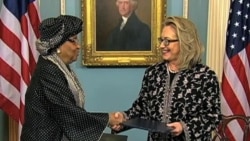STATE DEPARTMENT —
The United States is advocating a political solution in Mali while backing French military strikes against Islamist militants in the north of the country.
The Obama administration says it shares French military goals in the fight against Islamist militants in northern Mali and will help the Economic Community of West African States -- or ECOWAS -- send their own troops.
On Tuesday, Secretary of State Hillary Clinton discussed that support with Liberian President Ellen Johnson Sirleaf.
"The Secretary did outline the support that we are prepared to offer to ECOWAS countries, as she did make clear that we support the French forces and that we are looking at how best to respond to the requests that they’ve made as well," said State Department spokeswoman Victoria Nuland.
With rebels in northern Mali linked to al-Qaida, the conflict holds risks for security across the region.
"This constitutes not just a threat against a sovereign state but potentially a trans-national threat that can move across the borders into Niger, into Burkina Faso, into Mauritania, into Senegal as well as Algeria and other places," added Johnnie Carson, U.S. Assistant Secretary of State for African Affairs.
Helping Malian forces regain ground will involve Algeria.
"It has a military that knows the terrain, that knows the players, that has dealt with this before. And so it is going to be absolutely critical to get them engaged," noted Jennifer Cooke, with the Center for Strategic and International Studies.
Algeria and the U.S. are working to bring moderates among the northern rebels into a political solution. Ambassador Carson says that is essential.
"Equally important for us, as well as for the people of Mali, is that they move forward in an expeditious manner as quickly as they can to put in place a roadmap and a the United States is pushing for elections by April," said Carson.
Cooke says that is unlikely given the weakness of the transitional government in Bamako. "There's so little trust right now in any political structure in Bamako that it's going to take I think a lot of external pressure and external support and oversight to make that work," she stated.
If Mali's transitional leaders are unable to organize elections by April, there will be outside pressure for a reconstituted interim administration with less military influence and greater participation from the north.
The Obama administration says it shares French military goals in the fight against Islamist militants in northern Mali and will help the Economic Community of West African States -- or ECOWAS -- send their own troops.
On Tuesday, Secretary of State Hillary Clinton discussed that support with Liberian President Ellen Johnson Sirleaf.
"The Secretary did outline the support that we are prepared to offer to ECOWAS countries, as she did make clear that we support the French forces and that we are looking at how best to respond to the requests that they’ve made as well," said State Department spokeswoman Victoria Nuland.
With rebels in northern Mali linked to al-Qaida, the conflict holds risks for security across the region.
"This constitutes not just a threat against a sovereign state but potentially a trans-national threat that can move across the borders into Niger, into Burkina Faso, into Mauritania, into Senegal as well as Algeria and other places," added Johnnie Carson, U.S. Assistant Secretary of State for African Affairs.
Helping Malian forces regain ground will involve Algeria.
"It has a military that knows the terrain, that knows the players, that has dealt with this before. And so it is going to be absolutely critical to get them engaged," noted Jennifer Cooke, with the Center for Strategic and International Studies.
Algeria and the U.S. are working to bring moderates among the northern rebels into a political solution. Ambassador Carson says that is essential.
"Equally important for us, as well as for the people of Mali, is that they move forward in an expeditious manner as quickly as they can to put in place a roadmap and a the United States is pushing for elections by April," said Carson.
Cooke says that is unlikely given the weakness of the transitional government in Bamako. "There's so little trust right now in any political structure in Bamako that it's going to take I think a lot of external pressure and external support and oversight to make that work," she stated.
If Mali's transitional leaders are unable to organize elections by April, there will be outside pressure for a reconstituted interim administration with less military influence and greater participation from the north.





